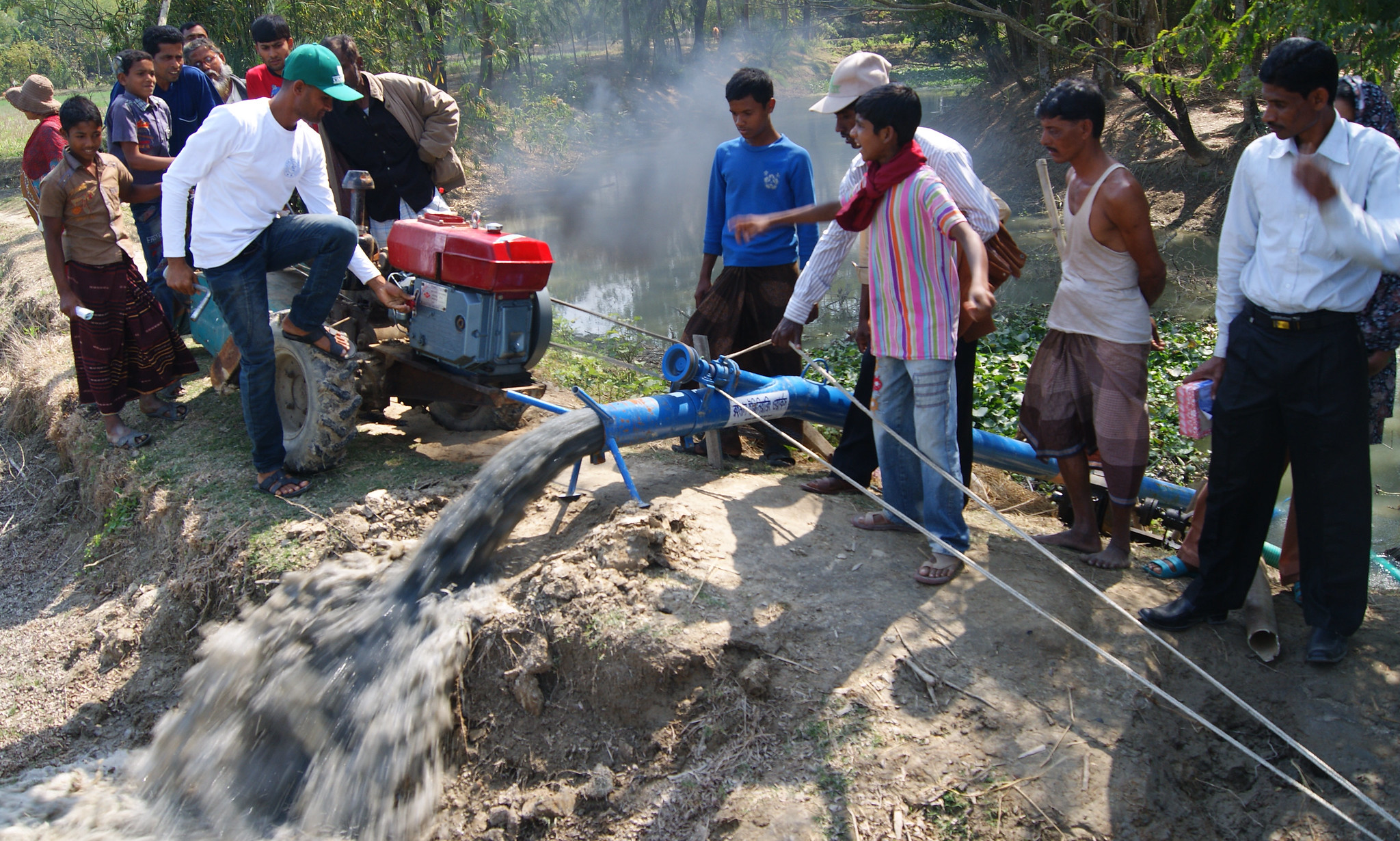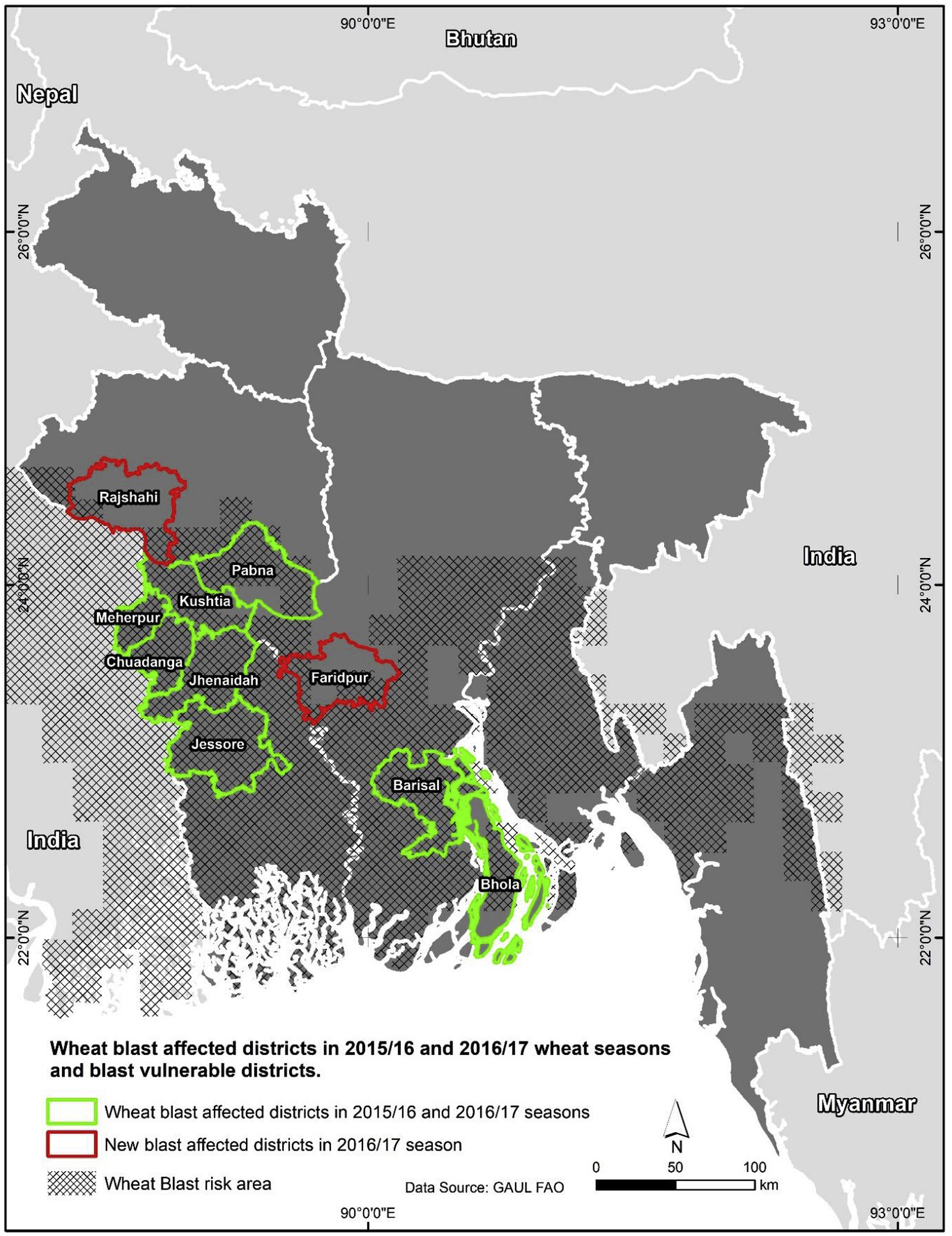At present, nearly half of the world’s population is under some form of government restriction to curb the spread of COVID-19. In Bangladesh, in the wake of five deaths and 48 infections early in the year, the government imposed a nationwide lockdown between March 24 and May 30, 2020. Until April 17, 38 of the country’s 64 districts were under complete lockdown.
“While this lockdown restricted the spread of the disease, in the absence of effective support, it can generate severe food and nutrition insecurity for daily wage-based workers,” says Khondoker Mottaleb, an agricultural economist based at the International Maize and Wheat Improvement Center (CIMMYT).
Of the 61 million people who make up Bangladesh’s employed labor force, nearly 35% are paid daily. In a new study published in PLOS ONE, Mottaleb examines the food security and welfare impacts of the lockdowns on these daily-wage workers — in both farm and non-farm sectors — who are comparatively more resource-poor in terms of land ownership and education, and therefore likely to be hit hardest by a loss in earnings.
Using information from 50,000 economically active workers in Bangladesh, collected by the Bangladesh Bureau of Statistics (BBS), the study quantifies the economic losses from the COVID-19 lockdowns based on daily-wage workers’ lost earnings and estimates the minimum compensation packages needed to ensure their minimum food security during the lockdown period.
Using the estimated daily wage earnings, the authors estimate that a one-day, complete lockdown generates an economic loss equivalent to $64.2 million. After assessing the daily per capita food expenditure for farm and non-farm households, the study estimates the need for a minimum compensation package of around $1 per day per household to ensure minimum food security for the daily wage-based worker households.
In May 2020, the Government of Bangladesh announced the provision of approximately $24 per month to two million households, half of whom will receive additional food provision. While this amount is in line with Mottaleb’s findings, he stresses than this minimum support package is only suitable for the short-term, and that in the event of a prolonged lockdown period it will be necessary to consider additional support for other household costs such as clothing, medicine and education.
“Without effective support programs, the implementation of a strict lockdown for a long time may be very difficult, if poor households are forced to come out to search for work, money and food,” explains Mottaleb. “In the event of a very strict lockdown scenario, the government should consider issuing movement passes to persons and carriers of agricultural input and output to support smallholder agriculture, wage workers and agricultural value chains.”
Read the full article:
COVID-19 induced economic loss and ensuring food security for vulnerable groups: Policy implications for Bangladesh
Read more recent publications from CIMMYT researchers:
- Potential of climate-smart agriculture in reducing women farmers’ drudgery in high climatic risk areas. 2020. Khatri-Chhetri, A., Punya Prasad Regmi, Nitya Chanana, Aggarwal, P.K. In: Climatic Change v. 158, pg. 29-42.
- Crop–livestock integration in smallholder farming systems of Goromonzi and Murehwa, Zimbabwe. 2020. Mkuhlani, S., Mupangwa, W., MacLeod, N., Lovemore Gwiriri, Nyagumbo, I., Manyawu, G., Ngavaite Chigede. In: Renewable Agriculture and Food Systems v. 35, no. 3, pg. 249-260.
- Effects of maize residue and mineral nitrogen applications on maize yield in conservation-agriculture-based cropping systems of Southern Africa. 2020. Mupangwa, W., Thierfelder, C., Cheesman, S., Nyagumbo, I., Muoni, T., Mhlanga, B., Mwila, M., Sida T.S., Ngwira, A. In: Renewable Agriculture and Food Systems v. 35, no. 2, pg. 322-335.
- From interest to implementation: exploring farmer progression of conservation agriculture in Eastern and Southern Africa. 2020. Brown, B., Nuberg, I., Llewellyn, R. In: Environment, Development and Sustainability v. 22, pg. 3159-3177.
- Spatial variability of soil physicochemical properties in agricultural fields cultivated with sugarcane (Saccharum officinarum L.) in southeastern Mexico. 2020. Salgado-Velázquez, S., Salgado-García, S., Rincón-Ramírez, J.A., Rodrigues, F., Palma-López, D.J., Córdova-Sánchez, S., López-Castañeda, A. In: Sugar Tech v. 22, pg. 65-75.
- Apparent gains, hidden costs: examining adoption drivers, yield, and profitability outcomes of rotavator tillage in wheat systems in Nepal. 2020. Paudel, G.P., Krishna, V.V., McDonald, A. In: Journal of Agricultural Economics v. 71, no. 1, pg. 199-218.
- Multi‐site bundling of drought tolerant maize varieties and index insurance. 2020. Awondo, S.N., Kostandini, G., Setimela, P.S., Erenstein, O. In: Journal of Agricultural Economics v. 71, no.1, pg. 239-259.
- Leaving no one behind: how women seize control of wheat–maize technologies in Bangladesh. 2020. Farnworth, C.R., Jafry, T., Rahman, S., Badstue, L.B. In: Canadian Journal of Development Studies v. 41, no. 1, pg. 20-39.
- Learning adaptation to climate change from past climate extremes: evidence from recent climate extremes in Haryana, India. 2020. Aryal, J.P., Jat, M.L., Sapkota, T.B., Rahut, D.B., Rai, M., Jat, H.S., Sharma, P.C., Stirling, C. In: International Journal of Climate Change Strategies and Management v. 12. No. 1, pg. 128-146.
- Climate change mitigation options among farmers in South Asia. 2020. Aryal, J.P., Rahut, D.B., Sapkota, T.B., Khurana, R., Khatri-Chhetri, A. In: Environment, Development and Sustainability v. 22, pg. 3267-3289.
- Does climate-smart village approach influence gender equality in farming households? A case of two contrasting ecologies in India. 2020. Hariharan, V.K., Mittal, S., Rai, M., Agarwal, T., Kalvaniya, K.C., Stirling, C., Jat, M.L. In: Climatic Change v. 158, pg. 77-90.
- First Report of TTRTF race of wheat stem rust, Puccinia graminis f. sp. tritici, in Ethiopia. 2020. Tesfaye, T., Chala, A., Shikur, E., Hodson, D.P., Szabo, L.J. In: Plant Disease v. 104, no. 1, 293-293.
- Multi-level socioecological drivers of agrarian change: longitudinal evidence from mixed rice-livestock-aquaculture farming systems of Bangladesh. 2020. Aravindakshan, S., Krupnik, T.J., Groot, J.C.J., Speelman, E. N., Amjath Babu, T.S, Tittonell, P. In: Agricultural Systems v. 177, art. 102695.
- Carbon sequestration potential through conservation agriculture in Africa has been largely overestimated: comment on: “Meta-analysis on carbon sequestration through conservation agriculture in Africa”. 2020. Corbeels, M., Cardinael, R., Powlson, D.S., Chikowo, R., Gerard, B. In: Soil and Tillage Research v. 196, art. 104300.
- Operationalizing the concept of robustness of nitrogen networks in mixed smallholder systems: a pilot study in the mid-hills and lowlands of Nepal. 2020. Alomia-Hinojosa, V., Groot, J.C.J., Speelman, E. N., Bettinelli, C., McDonald, A., Alvarez, S., Tittonell, P. In: Ecological Indicators v. 110, art. 105883.
- The spread of smaller engines and markets in machinery services in rural areas of South Asia. 2020. Justice, S., Biggs, S. In: Journal of Rural Studies v. 73, pg. 10-20.
- Functional farm household typologies through archetypal responses to disturbances. 2020. Tittonell, P., Bruzzone, O., Solano-Hernández, A., Lopez-Ridaura, S., Easdale, M.H. In: Agricultural Systems v. 178, art. 102714.
- Data on a genome-wide association study of type 2 diabetes in a Maya population. 2020. Totomoch-Serra, A., Domínguez-Cruz, M.G., Muñoz, M. de L., García-Escalante, M.G., Burgueño, J., Diaz-Badillo, A., Valadez-González, N., Pinto-Escalantes, D. In: Data in Brief v. 28, art. 104866.
- On-farm performance and farmers’ participatory assessment of new stress-tolerant maize hybrids in Eastern Africa. 2020. Regasa, M.W., De Groote, H., Munyua, B., Makumbi, D., Owino, F., Crossa, J., Beyene, Y., Mugo, S.N., Jumbo, M.B., Asea, G., Mutinda, C.J.M., Kwemoi, D.B., Woyengo, V., Olsen, M., Prasanna, B.M. In: Field Crops Research v. 246, art. 107693.
- Different uncertainty distribution between high and low latitudes in modelling warming impacts on wheat. 2020. Wei Xiong, Asseng, S., Hoogenboom, G., Hernandez-Ochoa, I.M., Robertson, R., Sonder, K., Pequeno, D.N.L., Reynolds, M.P., Gerard, B. In. Nature Food v. 1, pg. 63-69.
- Gender relations along the maize value chain in Mozambique. 2020. Adam, R.I., Quinhentos, M., Muindi, P., Osanya, J. In: Outlook on Agriculture v. 49, no. 2, pg. 133–144.
- Genetic dissection of zinc, iron, copper, manganese and phosphorus in wheat (Triticum aestivum L.) grain and rachis at two developmental stages. 2020. Cu, S.T., Guild, G., Nicolson, A., Velu, G., Singh, R.P., Stangoulis, J. In: Plant Science v. 291, art. 110338.
- Indigenous knowledge of traditional foods and food literacy among youth: insights from rural Nepal. 2020. Gartaula, H., Patel, K., Shukla, S., Devkota, R. In: Journal of Rural Studies v. 73, pg. 77-86.
- Analysis of household access to drinking water, sanitation, and waste disposal services in urban areas of Nepal. 2020. Behera, B., Rahut, D.B., Sethi, N. In: Utilities Policy v. 62, art. 100996.
- Mapping of QTL for partial resistance to powdery mildew in two Chinese common wheat cultivars. 2020. Xiaoting Xu, Zhanwang Zhu, Aolin Jia, Fengju Wang, Jinping Wang, Yelun Zhang, Chao Fu, Luping Fu, Guihua Bai, Xianchun Xia, Yuanfeng Hao, He Zhonghu In: Euphytica v. 216, no. 1, art. 3.
- Enabling smallholder farmers to sustainably improve their food, energy and water nexus while achieving environmental and economic benefits. 2020. Gathala, M.K., Laing, A.M., Tiwari, T.P., Timsina, J., Islam, Md.S., Chowdhury, A.K., Chattopadhyay, C., Singh, A.K., Bhatt, B. P., Shrestha, R., Barma, N.C.D., Dharamvir Singh Rana, Jackson, T., Gerard, B. In: Renewable and Sustainable Energy Reviews v. 120, art. 109645.
- Harnessing wheat Fhb1 for Fusarium resistance. 2020. Yuanfeng Hao, Rasheed, A., Zhanwang Zhu, Wulff, B.B.H., He Zhonghu In: Trends in Plant Science v. 25, no. 1, pg. 1-3.
- Energy-efficient, sustainable crop production practices benefit smallholder farmers and the environment across three countries in the Eastern Gangetic Plains, South Asia. 2020. Gathala, M.K., Laing, A.M., Tiwari, T.P., Timsina, J., Saiful Islam, Bhattacharya, P.M., Dhar, T., Ghosh, A., Sinha, A.K., Chowdhury, A.K., Hossain, S., Hossain, M.I., Molla, M.S.H., Rashid, M., Kumar, S., Kumar, R., Dutta, S.K., Srivastwa, P.K., Chaudhary, B., Jha, S.K., Ghimire, P., Bastola, B., Chaubey, R.K., Kumar, U., Gerard, B. In: Journal of Cleaner Production v. 246, art. 118982.
Feature image: A rice farmer in central Bangladesh tends to his crop. (Photo: Scott Wallace/World Bank).

 Innovations
Innovations 


